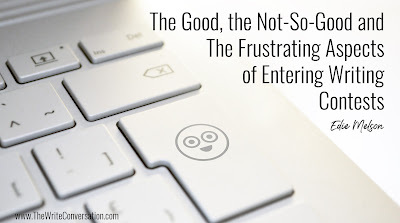Edie Melson's Blog, page 89
May 16, 2023
An Expandable Outline for Bible-Based Blog Posts

by Katy Kauffman @KatyKauffman28
Do you blog from a feeling of inspiration, or do you follow an outline? I know some writers feel that an outline is too restrictive. I often want to sit down and just start typing. But sometimes, once I’ve written my lead-in and its connection to a spiritual principle, I am unsure what to write next.
So let’s talk about an expandable outline for blog posts. Whether you write devotions, Christian living, or short Bible studies on your blog, you can take this outline and plump it out to share what’s bubbling in your heart and waiting to spill out.
Don’t forget it’s a good idea to keep posts to 500 – 800 words. What genre you pick determines what you focus on.
Devotions focus on a story with a spiritual point.Christian living focuses on application of Scripture and Biblical wisdom for everyday life.Bible studies focus on explaining Scripture and giving application.
A User-Friendly Outline
Try using this outline and expand each part as needed, depending on your genre.
1. Start with a story.
Captivate your readers’ attention with a story that introduces your main point. Lead-ins can be two to six paragraphs long, depending on what genre you’re writing in. Since devotions are mostly made up of stories, your lead-in may be longer.
Show; don’t tell. Share the story in such a way that the reader can experience it with you. Set the scene, share the feelings, show the conflict, and lead to the resolution (either in the lead-in or later in the post).
2. Transition to your spiritual point.
Just like Jesus used stories and illustrations to make a spiritual point, we can too. After you share your story, transition to your spiritual point using words from the lead-in.
When I wrote about being all in for God, I used the story of American gymnast Keri Strug. In the 1996 Summer Olympics, she fell on her first vault landing and hurt her ankle. But she didn’t quit. She pushed through her second vault attempt and “stuck” her landing, giving her team the gold medal.
After I shared her story, I transitioned to my spiritual point sharing that sometimes it will be hard to do our God-given assignments and we wonder if we can continue. But if we push through the pain and “stick our landing,” God can turn it into gold for us and the team.
So be sure to take key phrases from your story and use them in your transition paragraph to show the connection between the physical realm and the spiritual.
3. Scripture
The Bible is God’s voice and heart that speak to every generation. We can encourage the reader with our personal stories, but we always need to share the powerful Word of God which changes lives and strengthens souls.
4. Comment on Scripture, and share application for life today.
What would you like to say about a particular Bible passage? What does it mean? How is it relevant to life today? Share some insights about your Scripture passage that drive home your main point. Include the best elements for your message—definitions, cross-references, examples, illustrations, and stories.
And don’t ever forget the application. This is the heart of our writing. After we’ve grabbed our readers’ attention with a lead-in, transitioned to our spiritual point, shared the Scripture, and talked about it, we can show its relevance to our everyday lives. Understanding Scripture and practicing it releases God’s power, peace, and joy into our lives.
5. Final Takeaway
Drive home your point with one final takeaway, or point of application. What else can you say that emphasizes your main idea or adds to it? Something that reinforces the why or the how behind what you’re sharing. End with this final takeaway, and ask a question to generate some conversation in the comments section.
Which part of the outline do you tend to focus on the most? The story? The application? Tell us in the comments below, and happy blogging!
TWEETABLEAn Expandable Outline for Bible-Based Blog Posts from @KatyKauffman28 on @EdieMelson (Click to Tweet)
 Katy Kauffman is an award-winning author, an editor of Refresh Bible Study Magazine, and a co-founder of LIGHTHOUSE BIBLE STUDIES. She loves connecting with writers and working alongside them in compilations, such as Feed Your Soul with the Word of God, Collection 1 which is a 2020 Selah Awards finalist. She also enjoys encouraging writers and giving writing tips in her monthly writers’ newsletter called THE LIGHTHOUSE CONNECTION.
Katy Kauffman is an award-winning author, an editor of Refresh Bible Study Magazine, and a co-founder of LIGHTHOUSE BIBLE STUDIES. She loves connecting with writers and working alongside them in compilations, such as Feed Your Soul with the Word of God, Collection 1 which is a 2020 Selah Awards finalist. She also enjoys encouraging writers and giving writing tips in her monthly writers’ newsletter called THE LIGHTHOUSE CONNECTION.In addition to online magazines, Katy’s writing can be found at CBN.COM, thoughts-about-God.com, and three blogs on writing. She loves to spend time with family and friends, create art and make crafts with her group MY ARTSY TRIBE, and tend the garden in the morning sun. She makes her home in a cozy suburb of Atlanta, Georgia. Connect with her on FACEBOOK and TWITTER.
Published on May 16, 2023 22:00
May 15, 2023
The Good, the Not-So-Good and The Frustrating Aspects of Entering Writing Contests

by Edie Melson @EdieMelson
We’ve just announced the finalists in all the contests in conjunction with the Blue Ridge Mountains Christian Writers Conference, so writing contests are on my mind. Over the past few weeks I’ve done everything from congratulate to commiserate with writers who entered, and it’s made me consider how I view contests—and how I should view contests.
It’s easy for me to be unbiased when it comes to this particular contest because I’m not allowed to enter it. My assistant director, Edwina Perkins and I, along with contest director, Eva Marie Everson, set the contest up that way on purpose to protect the integrity of the judging.
Before you jump to any conclusions, NO we don’t have anything to do with the judging for this contest. We really don’t have much to do with the contest at all. We leave that up to the amazing Eva Marie Everson. She does a fantastic job, including protecting this contest with the ferociousness of a she-wolf defending her young. And to be clear, she doesn’t do any of the judging either. She pulls in readers to give their honest opinions about the books entered. We don’t allow editors or agents or anyone else with connections to specific parts of the industry take part in the judging.
But readers are fickle—and opinionated. What one likes, another dislikes. And that is what’s at the heart of this post. Entering a writing contest isn’t like solving a math problem for the right answer, it’s subjective and unpredictable.
Enter the Not-So-GoodFact 1: Good books don’t always win. Sometimes they don’t even make the finalist list.
Fact 2: What we may consider as “poor books” sometimes win and make the finalist list.
Conclusion: Writing contests aren’t FAIR.
Now the TruthWriting contests aren’t fair. Yep I said it—and I’ll go one step further. Very little about the publishing world is fair. It’s a subjective industry full of unpredictable people. But just because a contest isn’t fair, doesn’t mean it doesn’t have value.
Let’s look at the concept of fairness. It’s something we learned about in Kindergarten and while it had purpose there, it pretty much skewed our perception of how things should be.
Truthfully, life isn’t fair.
So why enter a contest if it’s not going to give us a fair shot? But that’s another misconception. Contests really do give authors a pretty fair shot. We do everything we can to limit the biases and equal the playing field. But we’re part of a subjective industry, so the end results don’t always appear fair.
Look beyond winning and losing to find the value in entering writing contests.
Onto the GoodValue #1: Experience submitting your work without knowing the outcome. It’s good practice for submitting our work for publication.
Value #2: Visibility. Even if we don’t win, there are judges who see our work. Many contracts have come from a judge seeing a writer’s work—whether it won or not.
Value #3: The possibility of winning.
Acknowledging Frustrating EmotionsEntering a writing contest does engage our emotions, no matter how much we try to keep it from happening. There’s nothing wrong with getting excited when we win, or sad when we don’t. The important thing is to keep our perspective. Winning or not winning a contest won’t make or break us. Publishing is a journey. It has highs and lows, as well as easy times and difficult ones.
Publishing is also a career and/or ministry choice for many of us. When that’s the case, we need to remain professional in all our dealings. Calling out a contest and labeling it as unfair won’t change the system, but it will make us look petty and unprofessional. Rubbing a win in the faces of others has the same negative impact on our publishing goals.
Bottom LineGo ahead a take a chance and enter the contests that appeal to you. Increase the odds by following the directions exactly and make sure the contest you’re entering is a good fit for the writing you’ve done. Then sit back and enjoy the ride. Sometimes you win, sometimes you don’t, but good will come out of the experience, no matter what.
These are my thoughts on entering contests. I’d love to know yours. Be sure to leave a comment in the section below.
And don’t forget to join the conversation!Blessings, Edie
TWEETABLEThe Good, the Not-So-Good and The Frustrating Aspects of Entering Writing Contests from @EdieMelson (Click to Tweet)
 Edie Melson is a woman of faith with ink-stained fingers observing life through the lens of her camera. No matter whether she’s talking to writers, entrepreneurs, or readers, her first advice is always “Find your voice, live your story.” As an author, blogger, and speaker she’s encouraged and challenged audiences across the country and around the world. Her numerous books reflect her passion to help others develop the strength of their God-given gifts and apply them to their lives. Connect with her on her website, through Facebook, Twitter and Instagram.
Edie Melson is a woman of faith with ink-stained fingers observing life through the lens of her camera. No matter whether she’s talking to writers, entrepreneurs, or readers, her first advice is always “Find your voice, live your story.” As an author, blogger, and speaker she’s encouraged and challenged audiences across the country and around the world. Her numerous books reflect her passion to help others develop the strength of their God-given gifts and apply them to their lives. Connect with her on her website, through Facebook, Twitter and Instagram.
Published on May 15, 2023 22:00
May 14, 2023
Tips to Begin Your Writing Conference Follow Up Before Leaving Home

by Karen Whiting @KarenHWhiting
It costs money and time to attend a conference, so make the most of your investment. Prepare with setting goals and strategizing to make the most of opportunities. Plans help guide you in how to follow up with people you meet at the conference. Part of this includes studying the faculty, attendees, and schedule. Begin it all with prayer and asking God to help you make the best connections for you.
PREPARE and PRAY-PARE
Decide how to track networking. This could be on your phone notes, in a small conference bullet journal you create, or on a spread sheet. Choose whatever works best for you.
List your dreams and goals for the conference. Understand that unless your work is well edited and you have a great platform, a contract may not come from your first few conferences. That’s okay. God called Abraham to birth a nation and it took 25 years before God blessed him with Abraham. Ask yourself if you want an Ishmael (doing it your way) or an Isaac (God’s way). Set some realistic goals too. Then pray over them and ask God’s advice.
Consider what you hope to accomplish:Get published in articles or booksWho you want to meetYour genre and connections with other writers in that genreBuilding friendships and community, including people who live near you or can connect online at times that fit your schedule.What you most need to learn or do next in your writing journey
Study Ahead
Read the faculty bios and classes each will teach. Note what faculty you’d like to meet. Mark what classes most interest you and what ones you need most. For agents and editors, go to their websites and check out what they represent/publish and any guidelines. If they have a blog, start reading it. Check out faculty who publish in your genre as well as ones you read and admire. Follow them. Match up faculty you want to meet with a class the person is teaching and attend it. That helps you get to know that faculty member and learn about what they publish or write.
Prepare QuestionsWhat do you want to know from each person you’d like to meet.What gets them excited in a proposal?What are they currently representing or publishing that they are passionate about?Where do they live and what hobbies do they enjoy.
Pack well
Pack your business cards, proposal one-sheets, and list of article or devotional ideas to pitch. Practice your pitch at home. Bring comfortable shoes for walking and standing. Have jackets or sweaters in case it’s cold. Check the schedule to see if any events are dressy.
START NETWORKING Once You Arrive
Greet and Meet
Talk to people you meet. Exchange business cards and note a detail on the back or a reason to follow up. Be ready when any signups for appointments are schedules. For meals, see if there are assigned tables for editors and agents so you can try to sit with one at a meal. Don’t try to rush or push, but go where there are open spots and trust God.
At meals, be friendly and ask what other people are working on and about their successes. Share when asked.
Rejoice at Opportunities
Be thankful for any opportunities. Take notes of responses to your pitches. If an editor expresses interest, ask for the best way to follow up and what you should send. If they are not interested, ask for advice of what you should do next.
For authors you meet and click with, be sure to ask how you can stay connected. For busier authors, be sure to follow them and make comments on their posts.
Daily Follow Up
In the evening or morning, make notes of any follow up you should do, especially requested articles or proposals to send in. Prioritize these notes, so you can tackle what’s most important first. This includes thank-you notes to send.
FOLLOW THROUGH AFTER THE CONFERENCE
Once back home, take a break for a day or two. Pray. See what remains in your mind and act on those first. Prioritize your follow up notes and schedule at least one network activity a day. This should include applying lessons learned, sending in requested material, connecting with people you met, and rewriting as needed.
Note anyone you had hoped to connect with but never had the opportunity. Send the person a note or message on social media. Make notes of what worked best for you in networking and what you’d like to change of add in the future.
Build on relationships you made by staying in touch. That can be with a regular meet up online or in person, posting comments, reviewing books, or hiring a coach you meet whom you believe can help you move forward. If there were invites to join a critique group, guest blog, or start a genre Facebook group, decide what to do and let the person know your choice.
Review your writing schedule and see if you need to add more writing or marketing time to your schedule. Remember to honor what God has called you to do.
TWEETABLETips to Begin Your Writing Conference Follow Up Before Leaving Home from author @KarenHWhiting on @EdieMelson (Click to Tweet)
 Karen Whiting (WWW.KARENWHITING.COM) is an international speaker, former television host of Puppets on Parade, certified writing and marketing coach, and award-winning author of twenty-seven books for women, children, and families. Her newest book, The Gift of Bread: Recipes for the Heart and the Table reflects her passion for bread and growing up helping at her grandparent’s restaurant. Check out her newest book Growing a Mother’s Heart: Devotions of Faith, Hope, and Love from Mothers Past, Present, and Future. It's full of heartwarming and teary-eyed stories of moms.
Karen Whiting (WWW.KARENWHITING.COM) is an international speaker, former television host of Puppets on Parade, certified writing and marketing coach, and award-winning author of twenty-seven books for women, children, and families. Her newest book, The Gift of Bread: Recipes for the Heart and the Table reflects her passion for bread and growing up helping at her grandparent’s restaurant. Check out her newest book Growing a Mother’s Heart: Devotions of Faith, Hope, and Love from Mothers Past, Present, and Future. It's full of heartwarming and teary-eyed stories of moms.Karen has a heart to grow tomorrow’s wholesome families today. She has written more than eight hundred articles for more than sixty publications and loves to let creativity splash over the pages of what she writes. She writes for Crosswalk. Connect with Karen on Twitter @KarenHWhiting Pinterest KarenWhiting FB KarenHWhiting.
Published on May 14, 2023 22:00
May 13, 2023
Thoughts on the Need for Writers to Carve Out Time to Write and Self-Edit

by Martin Wiles @LinesFromGod
Let’s face it. Not all of us have the luxury or opportunity to write as our full-time profession. I’m one. In fact, only a small percentage of writers enjoy this life.
Five days each week, I teach writing, grammar, and editing skills to 120 rambunctious, less-than-focused, head-in-the-clouds middle schoolers—most of whom would rather be elsewhere. Over the past decade, I cannot calculate how often I’ve been asked, “Why do I need to learn this?”
On Sunday mornings, I travel forty-five minutes to a small country church that I pastor bi-vocationally. Although I am only “part-time,” I still must do the typical pastor things: prepare sermons, keep in touch with the sick and shut-ins, visit the hospital, teach Sunday school, and keep things running—hopefully smoothly—at the church.
And did I mention I have a wife who occasionally needs my attention? We may be married, but she still needs dating. Yes, I was a good husband and recently took her to see an Elvis impersonator. Our kids are grown and gone, but we still must keep up with the ones who live twelve hours away and the ones who live only one hour away. Ball games. Occasional visits. Texts. Snaps. Pictures.
Far be it from me to brag about how much I can do in a day. In the past, that led to a bleeding ulcer. I do have a Type-A personality, which helps with organization, but that doesn’t mean my plate can’t get overloaded quickly. In fact, it’s more likely to.
Presently, I manage two websites—plus my personal one—and edit for a few small publishing houses. And did I mention that I write monthly for several places—this one included—and am a contracted writer for a few more annually?
I am quite out of breath—but I imagine I am not the only one. I have a feeling many who read this have too much on their plates, too. As with any diet, we must reduce our amounts and watch what we eat more carefully to ensure we eat healthy foods. And hopefully, we have too much on our plates because we have more food choices (writing opportunities) that we can say “yes” to.
So, how do I make time to write, self-edit, freelance edit, and do life? I’ll admit my sleep numbers suffer, but I strive for seven hours. Since I’m not a night owl, I’m in bed by 9:15. This means I rise at 4:15 in the morning. Not all of us can do the morning thing, but whatever works, do it. For our eyes to see what they need to see through the writing and self-editing process—and for our brains to remember all the ins and outs we must recall—we need rest (adequate sleep plus other periods of down time). The early morning hours provide the time I need to write before I head to my day job(s).
I’ve also learned by trial and error to say “No.” I wish I could say yes to every writing and editing opportunity—especially those that pay well—but I can’t. None of us can. Trying to often entails missing sleep and rest, neglecting our families, avoiding opportunities to serve, and most importantly, skimping out on time with God and other believers.
And we should never lose sight of why we write to begin with. God has gifted and called us to this profession—full- or part-time. Writing for people or publications that pay nothing helps us maintain our perspective. I’m paid for about one half of my writing assignments; the remainder are freebies. But I figure if I do this for the right reason, God will take care of the bread and bills. And it just might be the free ones that land in the hands of those whom God has planned to see them.
As you carve out time to write and self-edit, make sure you don’t neglect sleep, overload your plate, or neglect God.
TWEETABLEThoughts on the Need for Writers to Carve Out Time to Write and Self-Edit from author Martin Wiles (@LinesFromGod) on @EdieMelson (Click to Tweet)
 Martin Wiles is the founder of Love Lines from God (WWW.LOVELINESFROMGOD.COM) and serves as Managing Editor for Christian Devotions and Directing Editor for VineWords. He has authored six books and has been published in numerous publications. His most recent book, DON'T JUST LIVE...REALLY LIVE, debuted in October of 2021. He is a freelance editor, English teacher, author, and pastor.
Martin Wiles is the founder of Love Lines from God (WWW.LOVELINESFROMGOD.COM) and serves as Managing Editor for Christian Devotions and Directing Editor for VineWords. He has authored six books and has been published in numerous publications. His most recent book, DON'T JUST LIVE...REALLY LIVE, debuted in October of 2021. He is a freelance editor, English teacher, author, and pastor.Featured Image: Photo by Jose Cerrato on Unsplash
Published on May 13, 2023 22:00
May 12, 2023
5 Tips to Cope with a Stressful Writing Season

by Beth K. Vogt @BethVogt
I’m one stressed writer as I prep this blog post. Juggling a lot of competing demands.
That’s my reality. Both my real life and my writing life are busy, busy, busy.
Maybe you know exactly what I mean.
What’s a writer to do besides put her head down, be stressed, and do all she’s got to do?
There must be a better way than writing while wading through stress.
There is.
And I have an action plan to get through this overwhelming season.
5 Coping Tips for a Stressful Writing Season
1. Enlist my prayer partners. I’m honest with my friends who pray for me daily. About how busy I am. The stress. Everything I need to do. Leaning into their prayers keeps me grounded and gives me hope.
2. Accept the season with grace. Avoiding all I must do adds to my stress as commitments pile up and time runs out. If I’m overcommitted, I need to admit it. This is also the time to let my yes be yes, and then buckle down and get things done. This busy, busy, busy time will pass, and I’ll catch my breath again, but for now, I need to be gracious with myself.
3. Don’t wash the elephants that aren’t going to be in the parade. It’s okay if I let the non-essentials go. This is not the time to daydream about that new novel. Not the time to go shopping, no matter how good that escape makes me feel. No cleaning closets, either. But I should keep exercising, even if it’s going for a walk or riding my exercise bike while reading through my manuscript.
4. Tackle the small stuff first. Sometimes I’ve got so much to do, it’s easy to spin my wheels and get nothing done. This is when I pick something simple from my To Do list. Staring down a book deadline and multiple guest blog posts? I tackle a 300-to-500-word blog post first. Even getting a rough draft of a blog post down is great because I can always come back and edit it later. (And yes, that’s exactly how this post got written.)
5. Break down the bigger stuff into smaller increments. I recommend doing your writer math. I look at how many days I have to accomplish my rough draft. Divide the word count by the days I have before I need to submit the manuscript. Now I know the daily word count and have a measurable goal for each day. I alternate between my book word count and my blog posts or between my writing goal and my real life tasks.
Stress happens, but with some planning and some grace, stress is manageable. Do any of these tips appeal to you where you are in your writing life?
TWEETABLE5 Tips to Cope with a Stressful Writing Season from author @BethVogt on @EdieMelson (Click to Tweet)
 Beth K. Vogt believes God’s best often waits behind the doors marked “Never.” She’s authored 14 novels and novellas, both romance and women’s fiction. Beth is a Christy Award winner, an ACFW Carol Award winner, and a RITA® finalist. Her novel Things I Never Told You, book one in her Thatcher Sisters Series by Tyndale House Publishers, won the 2109 AWSA Golden Scroll Award for Contemporary Novel of the Year. An established magazine writer and former editor of the leadership magazine for MOPS International, Beth blogs for Learn How to Write a Novel and The Write Conversation and also enjoys speaking to writers group and mentoring other writers. She lives in Colorado with her husband Rob, who has adjusted to discussing the lives of imaginary people. Connect with Beth at bethvogt.com.
Beth K. Vogt believes God’s best often waits behind the doors marked “Never.” She’s authored 14 novels and novellas, both romance and women’s fiction. Beth is a Christy Award winner, an ACFW Carol Award winner, and a RITA® finalist. Her novel Things I Never Told You, book one in her Thatcher Sisters Series by Tyndale House Publishers, won the 2109 AWSA Golden Scroll Award for Contemporary Novel of the Year. An established magazine writer and former editor of the leadership magazine for MOPS International, Beth blogs for Learn How to Write a Novel and The Write Conversation and also enjoys speaking to writers group and mentoring other writers. She lives in Colorado with her husband Rob, who has adjusted to discussing the lives of imaginary people. Connect with Beth at bethvogt.com.Featured Image: Photo by Elisa Ventur on Unsplash
Published on May 12, 2023 22:00
May 11, 2023
Make Your Time at a Writing Conference Easier and More Valuable with These Digital Apps

by Edie Melson @EdieMelson
The writing conference season is in full swing. While everyone knows the value of attending writing conferences, many be not be aware of the benefits gained with a few simple apps added to your mobile device(s). This month I’ll share some of my favorites, and how they help keep me on track.
The first thing you need to know is that the value of an app isn’t dictated by the cost. Many of my favorites are free, and the others are all quite reasonable.
Overall OrganizationDot Card: This isn't an app. But it's a digital version of your business card. I'm trying it this year and I'm excited about the possibilities. Here's the link to the website if you want to take a look: https://dot.cards/settings/support
DropBox: This app needs to be loaded on your desktop (or laptop) computer first. Save all your documents in DropBox and you can access them from all of your devices. I have the paid version but I also have thousands of photos I have saved there. For just documents, the free version may have enough storage for the average user.
CamCard: Business card scanner & reader: The value of this app is that I no longer have to keep up with business cards. I can just snap a picture of the back and front of the card, pick a category, even add notes.
Evernote: You either love it or hate it. But the truth is there's no better overall organizational system out there.
Taking NotesNoteshelf: This is by far my favorite note taking app. It isn’t free (around $5), but is available for android and apple, in versions for the phone and tablet. I use this instead of carrying a notebook and pen (much better on my back). I also use the Apple Pencil and absolutely LOVE it! It also makes it almost impossible to lose my notes because it syncs with DropBox and EverNote.
Dragon Dictation: I love Dragon Naturally Speaking, but I think I love the app even more. I have it on my iPhone and my iPad. I can dictate notes directly into the app and email them to myself from anywhere. Just be sure to email them immediately, otherwise the note will disappear.
Making ConnectionsFacebook, Twitter, Pinterest, Instagram: By now everyone knows the value of staying connected with social media. I have all the individual platform apps, just in case I want to post directly from there.
PicturesMore and more we’re connecting through images. It’s important that we have easy access to apps that make our images come to life.
WordSwag: This is a great app to add text to images. It’s completely free and my favorite.
Snapseed: This is my favorite app to help tune an image. I can crop, work on color, add filters, add frames, just about anything.
GeneralLastPass: In today’s world we need a password for almost everything—and for security they all have to be different. This app addresses that issue. It has a free version, which is excellent. But I use the paid version. I can store all my passwords securely and only have to remember the one to my LastPass. You can access LastPass from all your devices.
White Noise: This app has an entire catalogue of soothing sounds to help even the worst insomniac relax. It includes a timer feature, as well as an alarm, so you can wake up as refreshed as you went to sleep.
Nook, Kindle, iBook: I make sure they’re all up-to-date and the books I want to read are installed on the device I’m using.
Audible: I love my Audible app. I sometimes prefer it to White Noise when I’m trying to unwind. It’s also great to use on the airplane, waiting in the airport, or traveling in the car.
Streaming Sites: This is another favorite that I use to unwind back at the hotel. Sometimes all I need is a good laugh with some of my favorite shows to help put life back in perspective.
My Final TipBefore you leave home, make sure you’re logged into all your social media networks, like Twitter, Facebook, Instagram, Hootsuite, etc. This will save valuable time when you want to post an update on the go.
Now it's your time. There's no way any of us can know all the coolest apps. Which ones do you recommend?
Don't forget to join the conversation!Blessings,Edie
TWEETABLEMake Your Time at a Writing Conference Easier and More Valuable with These Digital Apps from @EdieMelson (Click to Tweet)
 Edie Melson is a woman of faith with ink-stained fingers observing life through the lens of her camera. She’s a writer who feels lost without her camera and a reluctant speaker who loves to encourage an audience. And she embraces the ultimate contradiction of being an organized creative. As an author, she knows the necessity of Soul Care and leads workshops around the country on staying connected to God. Her numerous books, including the award-winning Soul Care series andUnruffled, Thriving in Chaos reflect her passion to help others develop the strength of their God-given gifts and apply them to their lives.
Edie Melson is a woman of faith with ink-stained fingers observing life through the lens of her camera. She’s a writer who feels lost without her camera and a reluctant speaker who loves to encourage an audience. And she embraces the ultimate contradiction of being an organized creative. As an author, she knows the necessity of Soul Care and leads workshops around the country on staying connected to God. Her numerous books, including the award-winning Soul Care series andUnruffled, Thriving in Chaos reflect her passion to help others develop the strength of their God-given gifts and apply them to their lives. Edie is the director of The Blue Ridge Christian Writers Conference, popular speaker a numerous conferences, and a board member of the Advanced Writers and Speakers Association. Connect with her on www.EdieMelson.com and through social media.
Published on May 11, 2023 22:00
May 10, 2023
Conference Prayers and Praises for Writers

By Julie Lavender @JLavenderwrites
With conference season upon us and Blue Ridge Mountains Christian Writers Conference right around the corner, I’m ramping up my prayer time for those who’ll attend any number of great conferences over the next couple of months. Perhaps you’ll want to join me in lifting up fellow conferees in prayer for an exceptional time spent learning and growing as a writer and praises for the opportunity to gather as believers and writers to nurture our craft and continue on the path to publication.
Here are some of the verses that I like to pray over my writer and author friends, and please note that I sometimes change a word or two to include conferees, plural, or to adjust for a conference setting. I’ll include references for you to search for the Scripture in your favorite translation.
Conference Prayers
Here’s a week’s worth of prayers to add to your quiet time as we approach conference season. Join me in conversation with the Lord to prepare for our time together, and please share below some of your favorite verses to use when praying for conferees.
Open our eyes to see the wonderful truths in your instructions (Psalm 119:18). When we read and obey the instructions in your Word, God, help us share those truths in our writing, in fiction and nonfiction, so that out audience will draw nearer to you with everything we write. Help us gain wisdom and knowledge about writing from conference instructors so that we might better serve you. God, help us set our gaze on the path before us. With fixed purpose, looking straight ahead, help us ignore life’s distractions (Proverbs 4:25) that hinder our writing and take our focus off the path you want us to take. How beautiful upon the mountains are the feet of those who bring good news, who publish peace, who bring good news of happiness, who publish salvation, who say to Zion, “Your God reign.” (Isaiah 52:7). Thank you for my beautiful writing friends, Lord, whom I may only see a couple of times a year, but yet I hold close to my heart throughout the rest of the days. Thank you for their friendship, encouragement, and support. Show us the right path, O Lord, point out the road for us to follow. Lead us by your truth and teach us, for you are the God who saves us. All day long, we put our hope in you (Psalm 25:4-5). With guidance from experienced writers, faculty, and the sessions we attend, show us what you’d have us write that will glorify you and bring praise to your name.Dear God, help us be kind and compassionate to one another (Ephesians 4:32) throughout our time at the conference. Sometimes, we can get discouraged if an appointment doesn’t go well; sometimes we’re weary from lack of sleep and brain-overload, and sometimes we’re just not at our best, but help us show true kindness and love to all those we come in contact with while attending a conference.God, help us remember that you did not give us a spirit of fear but of power and love and self-control (2 Timothy 1:7) Help us lean into your strength when we’re pitching ideas or sharing projects with others at the conference. Lord, help us be generous to fellow conferees with words of kindness and encouragement and with wisdom about writing that we’ve gleaned along our own publishing journeys. Help us share with others what we’ve learned thus far along the path that you’ve laid out for us. Remind us often that your Word says in Proverbs 11:25, “A generous person will prosper; whoever refreshes others will be refreshed.” What are some of your favorite verses to pray over yourself or others as you get ready for conference season? Please share below and join in the conversation.
TWEETABLE
Conference Prayers and Praises for Writers from @JLavenderWrites on @EdieMelson (click to tweet)
 Author and journalist Julie Lavender looks forward to seeing old friends and meeting new ones at upcoming writers’ conferences. She is the author of Children’s Bible Stories for Bedtime (Penguin Random House), 365 Ways to Love Your Child: Turning Little Moments into Lasting Memories (Revell/Baker), a forthcoming mom’s devotional from Penguin Random House, and two picture books from End Game Press and its imprint.
Author and journalist Julie Lavender looks forward to seeing old friends and meeting new ones at upcoming writers’ conferences. She is the author of Children’s Bible Stories for Bedtime (Penguin Random House), 365 Ways to Love Your Child: Turning Little Moments into Lasting Memories (Revell/Baker), a forthcoming mom’s devotional from Penguin Random House, and two picture books from End Game Press and its imprint.
Published on May 10, 2023 22:00
May 9, 2023
How to Get Started in Ghostwriting (Part 2)

By Linda Gilden @LindaGilden
Maybe last month’s article has piqued your interest and you want to try your hand at it. There’s a lot to learn but it is certainly possible to do. And while you are learning to be a ghostwriter, you will learn to be a better writer as well. That will be a tremendous benefit to your writing career.
What You Need for Ghostwriting You will need a good, reliable computer or word processor to work on. If you have to wonder If you are going to be able to save your work or whether or not the computer will power down and you can’t save anything, it’s hard to work undistracted.A good recorder for your interview and chat times. First thing is to ask your client for permission to record your sessions. If he or she is hesitant, explain that you want to make sure you have exact quotes because you have recorded them. You can also learn about your client’s voice through listening to the recordings. Recordings are also time savers. You will not have to call your client as much and ask them to repeat a sentence or a story. It is also helpful to have a recorder that will transfer easily to your computer. Another time saver.Notebook and pen. Despite your recorder, you will want to have something you can take notes on. If there is a good story or one you think would make a good lead in the book, jot down a few words to help you remember your thought. You can also make notes of things you want to ask your client to give you a little more information about.Camera. (Your phone camera will be fine.) It would be helpful to have a few pictures of you and your client. You will also need a back cover picture and you never know when you might get a good one!
Additional Thoughts about GhostwritingLearn how much writing, if any, your client has done and how much he wants to be involved in the writing of his book. That could make a difference in the amount of time you have to spend with him or her. If your client is planning to write some of the book, be sure he or she is thick skinned and willing to consider the changes you recommend.What are you going to charge? It is much easier if you know what you will charge before you have to tell a potential client. So do your research, talk to other ghostwriters about what they charged when they were starting out. Consult the Writer’s Market. They usually have advice on what to charge.Discuss your client’s time line, when you will meet, and how much he wants you involved in the publication of the book (that will change your fee.) If your client is expecting you to market the book and find a publisher for it, you will spend a lot more of your time doing that. You can make suggestions to your client but if you are expected to make the contacts with the publishers that will take a lot of time. You will actually be acting as the agent of your client and that takes a lot of extra time.
Next month we will talk about how to market yourself as a ghostwriter and the important elements of your contract between you and your client.
TWEETABLEHow to Get Started in Ghostwriting Part Two by @Linda Gilden on @EdieMelson (Click to Tweet)
Don't Miss the Other Posts in this Series! What is Ghostwriting and How to Get Started (Part 1) How to Get Started in Ghostwriting (Part 2)
 Linda Gilden has coauthored 11 books with 5 different coauthors, with #12 and #13 debuting in 2022, adding a new co-author to the list. She loves every one of her coauthors and enjoys collaborating on interesting projects with them. She also has written many books on her own and realizes what a treasure and blessing a good co-author is.
Linda Gilden has coauthored 11 books with 5 different coauthors, with #12 and #13 debuting in 2022, adding a new co-author to the list. She loves every one of her coauthors and enjoys collaborating on interesting projects with them. She also has written many books on her own and realizes what a treasure and blessing a good co-author is.
Published on May 09, 2023 22:00
May 8, 2023
The Truth of Writing, Who Are You and What Do You Believe?

by Cindy K. Sproles @CindyDevoted
During the last two years, I’ve taught a class about writing Christian World View into the general market. It has been a challenge—not that the class doesn’t go well. Surprisingly, it’s filled to the brim each time I teach it. But the difficulty comes in figuring out what and how we as Christians cross over into the general market without meeting instant failure with the voice of the world screaming NO!
Let me qualify my writing by saying I write Appalachian historical. Religion was very much a part of the culture of the mountains in the 1800s, so I can get away with a bit more than the writer who is writing contemporary women. Still, I’ve had to learn to wage a strong battle to balance the thread of Christ against a world that pushes against Him.
Know what you believe: Having said that, the first thing a writer needs to know to write a Christian worldview into the general market is this: What do you believe? I know you’re saying this isn’t a formula to write into the general market. But indeed, it is probably the most important. If you, as a Christian and a writer, do not know what you believe, then you cannot effectively go into combat with the world.
We are bombarded daily with the desires of the world. Its goal is to desensitize us, even guilt us into crumbling to its beliefs. To write a solid Christian worldview, you must truthfully know what you believe and why. Only then can you placemark a niche into the general market with a Christian view. 2 Timothy 2:15 NIV tells us this. Do your best to present yourself to God as one approved, a worker who does not need to be ashamed and who correctly handles the word of truth. Know what and why you believe.
Understand you are not teaching the Christian: This is hard for the Christian writer because we know Christianese very well. What you must learn is that in this day in time, the majority of the world does not. Using terms like sin, redemption, spiritual, Holy Spirit, God, Jesus, and more are unfamiliar to many general market readers. Let’s clarify that not all general market readers are illiterate about Christianity. Many readers do understand, but they are the minority or they do not believe.
During the 1980s, a poll was taken to find a statistic on children in church. Poll takers discovered that of the children reared from 1970 and back, nearly 85% attended church or Sunday school weekly. By 1990 that number turned upside down, finding most children had never been through the doors of a church. So, how can you teach about sin when a child has no idea what sin is? 1 Corinthians 3:2 NIV states, I gave you milk, not solid food, for you were not yet ready for it. Indeed, you are still not ready.That is just what you do. You return to milk.
Remember, you aren’t surrendering your Christian beliefs by not using words like redemption or even Holy Spirit. You simply find a new way to say it. You show redemption through the events and changes in your character. You’re still writing fiction the old way because we must let a character change by the end of the story. We are simply not using normal Christian words to say it. Remember, the world needs milk first.
Let your characters make serious mistakes: Allow them to suffer the consequences of their actions. Just as in real-life, we cannot always rescue a character from themselves. As Christians, we know what peace we find in our faith, and often the desire to tell readers about all they can find in Christ is so overwhelming that we lose the truth of reality. The world sees “reality.” When we show a character who prays relentlessly for a parent not to die from illness, and they don’t—we are not being fully transparent. Of course, there are many times God hears our cries and prevents an illness from taking a life. But if you have a non-Christian teetering on the edge of belief in that situation and they begin to pray, yet their parent dies—they look at Christians and call us liars. You said Dad wouldn’t die if I prayed. My dad died anyway. They don’t understand that God doesn’t always answer our prayers how we want. He always answers, but it’s according to His will. The non-Christian doesn’t understand that. But when you allow truth to happen and have a character who comes through a loss stronger, readers begin to wonder what that character had that they, the reader, don’t. Now, we’ve struck a chord of curiosity that plants a seed. We are seed planters. God is the grower.
Truth is stranger than fiction: When we focus on the truth of incidents and their true outcomes, not what wewant to happen, suddenly, the tide turns. There is depth in truth. There are lessons to learn—you know this from your own life experiences. The Christian market loves those stories that tie up in a sweet bow, and everyone lives happily ever after. But the truth is. That is not what always happens. Our faith strengthens us, which the world needs to see. When polled about what they expect in a story’s ending, general market readers surprised the world by saying, “Satisfying.” The story doesn’t have to end tied up in a bow. It must end satisfying because that is how most of our life events end. We make lemonade out of the lemons. Again, there’s always an exception to the rule.
It’s important to know that I’m not asking you to change the writing rules. I’m asking you to change the vocabulary and focus on truth, not rainbows and polka dots. Learn to craft a story that, rather than having a come to Jesus moment, allows a change and leaves a desire for a Christ-like relationship. Show mistakes, consequences, and how your character wades through by changing and making good decisions. The unwritten rule is never to let the dog die. Readers will hate you. But the truth is, sometimes the dog does die. What do we learn from that? How do we grow? Show that, and then when a new puppy comes into the picture, we see how life moves ahead. It doesn’t stall.
Finally, pray over your writing: Practice handing it over to God and allowing Him to guide you. Learning how to rephrase thoughts, words, and actions takes practice. But you can do it. You’ll soon see threading a Christian worldview through your story is not as bad or hard as you thought, and you’ll make your way into the general market with solid stories of truth and hope.
TWEETABLEThe Truth of Writing, Who Are You and What Do You Believe? from author @CindyKSproles on @EdieMelson (Click to Tweet)
 Cindy K. Sproles is an author, speaker, and conference teacher. Having served for a number of years as a managing editor for Lighthouse Publishing of the Carolinas and Ironstream Media, Cindy now works as a mentor, coach, and freelance editor. She is the co-founder of Writing Right Author Mentoring Services with Lori Marett and she is the director of the Asheville Christian Writers Conference. Cindy is also the co-founder of Christian Devotions Ministries and WWW.CHRISTIANDEVOTIONS.US, as well as WWW.INSPIREAFIRE.COM. Her devotions are in newspapers and magazines nationwide, and her novels have become award-winning best-selling works. She is a popular speaker at conferences and a natural encourager. Cindy is a mountain girl, born and raised in the Appalachian mountains, where she and her husband still reside. She has raised four sons and now resorts to raising chickens where the pecking order is easier to manage. You can visit Cindy at WWW.CINDYSPROLES.COM or www.wramsforwriters.com.
Cindy K. Sproles is an author, speaker, and conference teacher. Having served for a number of years as a managing editor for Lighthouse Publishing of the Carolinas and Ironstream Media, Cindy now works as a mentor, coach, and freelance editor. She is the co-founder of Writing Right Author Mentoring Services with Lori Marett and she is the director of the Asheville Christian Writers Conference. Cindy is also the co-founder of Christian Devotions Ministries and WWW.CHRISTIANDEVOTIONS.US, as well as WWW.INSPIREAFIRE.COM. Her devotions are in newspapers and magazines nationwide, and her novels have become award-winning best-selling works. She is a popular speaker at conferences and a natural encourager. Cindy is a mountain girl, born and raised in the Appalachian mountains, where she and her husband still reside. She has raised four sons and now resorts to raising chickens where the pecking order is easier to manage. You can visit Cindy at WWW.CINDYSPROLES.COM or www.wramsforwriters.com.Featured Image: Photo by Christina @ wocintechchat.com on Unsplash
Published on May 08, 2023 22:00
May 7, 2023
When Fear Stops You in Your Writing Journey, How to Choose Joy

by Edie Melson @EdieMelson
Earlier in my career I found myself struggling with a project I was working. As I tried to figure out why, it dawned on me that I had let fear stop me in my tracks, instead of leaning into the joy of writing.
Some of the fears I battled included:Fear of failure.Fear of expectations.Fear of others and how I might be perceived.
No wonder I was having such a difficult time. The revelation stunned me. If there’s one thing I pride myself on (and that should have been my first clue I was about to fall flat on my face), it’s the thought that I’m not afraid of anything.
As I travel and speak to writers, that’s one of the first things I share with them. “You must approach this writing life with courage. Be brave and willing to try things that seem scary.”
Overcome the Fear Roadblock in Writing
1. I took it to God in prayer. His word is clear on the fact that we’re not supposed to fear. I acknowledged what I’d been doing and turned my fears over to Him.
2. I made a list of all the things I was afraid of. I didn’t just think about them in my mind. I put them on paper. Know what I discovered? Most of the things I was worried about looked pretty silly on paper.
3. I looked at the things that weren’t silly and turned them upside down. For example: I was afraid someone I loved would misunderstand my motive. To turn it upside down I considered the possibility that someone God loved would see Him more clearly. Yes, what I was fearful about could happen, but so could the other things. After looking at things differently, I decided it was worth the risk.
Or, I found myself fearful of getting nothing but rejections. I knew at this point in my journey, a certain number of rejections were necessary to get the acceptances I wanted. So I began to make a monthly goal for rejections. I knew if I got 25 rejections (for articles/short pieces) I'd get at least 4 acceptances. This made me look forward to getting rejections out of the way.
4. I gave myself permission to write where I was. I knew I needed to improve, but I also knew that part of the experience I needed would only come from submitting my work for possible publication. I chose to deny those voices in my head that warned of the bad things that could come.
Those were the things I did to face my fears. But I also had to make progress on learning to choose joy
Choose the Joy of Writing
1. I began to find things to do that let me play with words. I love words. I love finding new ways to combine them, find words I never knew existed, and discover the origins of phrases. To find new ways to combine words: I began looking at things commonly described and common metaphors and similes. I played with new ways to say common things. And I began a list of how I did it. To find new words: I used my thesaurus and looked up words I commonly used and found new words. Then I let those words lead me to more new words. To find origins of phrases: I used the Internet. I typed in a common phrase and read articles on how it originated.
2. I tried new things. At that point in my career I was primarily a freelance writer. So instead of articles, I tried poetry and even short stories and flash fiction. I also purchased a couple of books of writing prompts and even visited writing prompt websites. These exercises helped improved my writing.
3. I took classes and read books about other types of writing: mystery, romance, history, biography, and memoir were just a few.
4. I indulged in other creative endeavors. I found that when I took time to go out with my camera, doodle in my bullet journal and even visit art galleries, my own joy of writing returned.
Today I encourage you to take a long look at where you are with your writing. Ask yourself if you’re writing from a place of joy or a place of fear. Then leave a comment below, committing to a new season writing joy!
Don’t forget to join the conversation!Blessings,Edie
TWEETABLEWhen Fear Stops You in Your Writing Journey, How to Choose Joy from author @EdieMelson (Click to Tweet)
 Edie Melson is a woman of faith with ink-stained fingers observing life through the lens of her camera. No matter whether she’s talking to writers, entrepreneurs, or readers, her first advice is always “Find your voice, live your story.” As an author, blogger, and speaker she’s encouraged and challenged audiences across the country and around the world. Her numerous books reflect her passion to help others develop the strength of their God-given gifts and apply them to their lives. Connect with her on her website, through Facebook, Twitter and Instagram.
Edie Melson is a woman of faith with ink-stained fingers observing life through the lens of her camera. No matter whether she’s talking to writers, entrepreneurs, or readers, her first advice is always “Find your voice, live your story.” As an author, blogger, and speaker she’s encouraged and challenged audiences across the country and around the world. Her numerous books reflect her passion to help others develop the strength of their God-given gifts and apply them to their lives. Connect with her on her website, through Facebook, Twitter and Instagram.
Published on May 07, 2023 22:00



